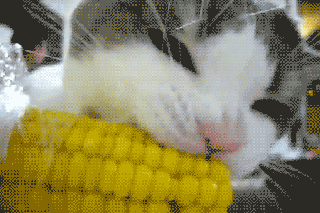<Since it was rap/hip-hop time, two for the price of none>
Average Metacritic score 82 (26 Reviews):
http://www.pitchforkmedia.com/record-re ... n/be.shtml
Common
Be (Geffen)
US release date: May 24, 2005
Rating: 8.6
Nowadays, Common won't leave you slack-jawed at his meta-metaphor verbal gymnastics. His flow is slowed and smoothed out, with understated emphasis and emotion taking the place of young-buck flashiness. The lack of instant-gratification couplets may disappoint at first, but each verse's rewarding intricacies become more evident with multiple listens.
Sonically, Be is utterly listenable: With just 11 songs in 42 minutes (including Pop's rap), the record is as succinct as its title. Be's brevity is not only welcomed but almost iconoclastic. Making the album speed by even faster is the intrinsic sense of continuity provided by West and the like-minded J Dilla. The famed dropout's nine tracks feature his signature sound with slight unconventional arrangement twists and scratch-down turns that prevent dull uniformity: Instead of a third verse on the two-sided adulterous saga "Faithful", the song segues into a celestial duet with John Legend tethered to the hook while wily eccentric Bilal soars above with his melismatic vocal theatrics.
Once a pupil of Chicago producer No I.D., who helped construct Common's early boom-bap sound, West does his mentor proud on Be, exuberantly pushing his one-time lyrical foe to unleash superior oratory skills while cutting-and-pasting archaic soul samples from forgotten artists such as gospel-tinged loverman DJ Rogers ("Faithful") and familial funk group Cornelius Brothers & Sister Rose ("Chi City"). Aside from the horn-laden "Real People", which nicks 70s organist Caesar Frazier's "Sweet Children" wholesale, West once again proves himself to be an inventive, natural talent behind the boards, as on "The Food," which flips the opening notes of Sam Cooke's "Nothing Can Change This Love" for its infectious piano loop.
There are no skippable songs on Be, but one decision disrupts the album's admirably consistent 68-degrees-in-the-shade vibe: The inclusion of the "Chappelle's Show" version of "The Food". Though the live take has an intensity missing on the studio version (released on vinyl last year), the Chappelle introduction and opening and closing applause pull the listener out of Be's palpable Southside surroundings. The album would have been better served by a redone studio take on the tune, which had the potential to be one of Be's finest.
Picayune flaws aside, the album's appeal stems from Common's passionate honesty. This invigorating trait means ballads like "Love Is..." and "It's Your World" don't melt into mush. The former sees him talking tender over a sinuous J Dilla beat that layers airy Marvin Gaye vocal samples atop each other to sublime effect. "Some say that I'm a dreamer because I talk about it often/ Seen the hardest nigga soften with his homey in a coffin," he says, admitting his romantic weaknesses while concurrently highlighting the inevitable downsides of such boundless affections. The latter features an unflinching, detailed narrative chronicling a downtrodden Midwestern prostitute's sympathetic plight: "I remember in high school, she had a passion to sing/ Now she see herself in her casket in dreams."
The woman's tale can be seen as a dreadful sequel to hip-hop's own plight in "I Used to Love H.E.R." More than a decade after that distillation of the pitfalls of the culture, hip-hop continues to relish in the violent and abusive tropes at an increasingly overt level. Still, Common lends power and self-worth to the character in "It's Your World", hoping she can use it to her advantage-- but also realizing her fate may be sealed. "She still wanna see California," he concludes. Whether she ever makes it is left lovingly, realistically unanswered.
-Ryan Dombal, June 1, 2005




